



Changes in PMLA Act empower ED
The Centre has issued a notification on certain changes in the Prevention of Money Laundering Act (PMLA). Under the Act, the Enforcement Directorate is empowered to conduct money laundering investigation.
- Treat money laundering as a stand-alone crime.
- Expand the ambit of “proceeds of crime” to assets that may have been derived from any other criminal activity related to scheduled offences.
- Deletion of provision in sub-sections (1) of Section 17 (Search and Seizure) and Section 18 (Search of Persons), doing away with the pre-requisite of an FIR or charge sheet by other agencies that are authorized to probe the offences listed in the PMLA schedule.
- Insertion of an explanation in Section 44 by which “The jurisdiction of the Special Court, while dealing with the offence under this Act, during investigation, enquiry or trial under this Act, shall not be dependent upon any orders passed in respect of the scheduled offence, and the trial of both sets of offences by the same court shall not be construed as joint trial.
- All PMLA offences will be cognizable and non-bailable. Therefore, ED officers are empowered to arrest an accused without warrant, subject to certain conditions.
- Amendment to section 3 makes concealment of proceeds of crime, possession, acquisition, use, projecting as untainted money, or claiming as untainted property as independent and complete offences under the Act. These activities have been explicitly declared to be continuing offences until such time a person is directly or indirectly “enjoying the proceeds of crime”.
- Power to the Centre to set up an Inter-Ministerial Coordination Committee for inter-departmental and inter-agency coordination for operational and policy level cooperation.
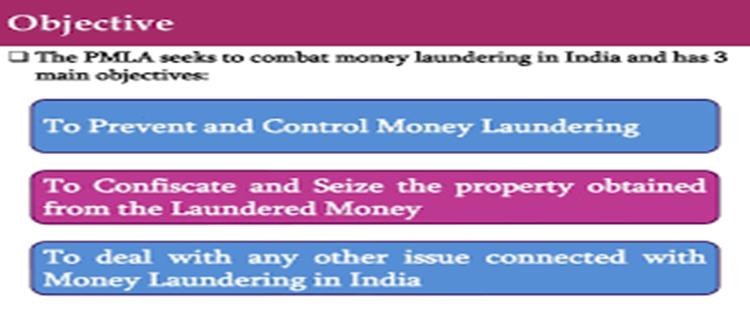
Reference: https://www.thehindu.com/todays-paper/tp-national/changes-in-pmla-act-empower-ed/article28919690.ece
Statehood for Jammu & Kashmir will be restored, says Prime Minister Modi
Prime Minister Narendra Modi, in a televised address to the nation on Thursday said it was a historic move and a new beginning for Jammu and Kashmir as well as Ladakh.
- Union Territory status for J&K from being a full State, was a “temporary” situation and that at some point statehood would be restored. Ladakh, would remain a Union territory.
- Assembly polls will be held in transparent manner and MLAs and the chief minister will be from among the people of the Union Territory.
- Article 370 had become a “weapon used by Pakistan against India and to invoke sentiments among the people.”
- Article 370 and Article 35A had only given terrorism, separatism, nepotism and massive corruption to Jammu and Kashmir (J&K).
- The Prime Minster pointed out that while the country took justifiable pride in its democratic process of law making, many of these laws including Right to Education, Minimum Wages Act, Acts that protect against atrocities on Dalits etc. were not applicable in the State in the past.
- He also pointed out that those who had settled in J&K after Partition could only vote in Lok Sabha polls and not the Assembly or local body polls. With the reading down of Articles 370 and 35A, this was now over, he said.
- He said the Union Territory status for Jammu and Kashmir and Ladakh also meant that the State police and administrative staff would get pay parity with the staff in other Union Territories.
- All vacancies in government jobs at both the Central and State levels will be filled soon.
- Recruitment for the Indian armed force and paramilitary from the two union territories will also be pushed.
- He assured people that jobs through public sector units and private sector would also make their way to the two Union Territories.
- He called for investors, film industry in particular to generate business in the State, delineating tourism, horticulture and handicrafts as the mainstay of the economy there.
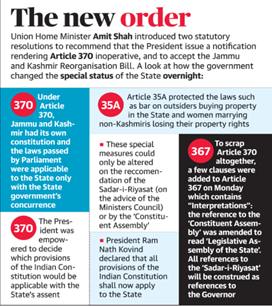
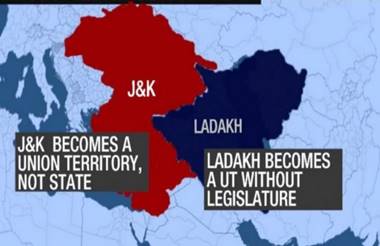
Reference : https://www.thehindu.com/news/national/statehood-for-jammu-kashmir-will-be-restored-pm/article28917530.ece
Many Bills dilute States’ powers: O’Brien
A day after Rajya Sabha Chairman Venkaiah Naidu hailed the recent parliamentary session for clearing 32 Bills, the highest in 17 years for a session, Trinamool Congress leader Derek O’Brien said many of them had violated the federal values of the Constitution.
- Many regional parties had opposed the Bills to amend the Unlawful Activities (Prevention) Act (UAPA), the Right to Information Act and the NIA Act, among others.
- The latest amendments to the UAPA Act empowered the Home Ministry to declare any individual a terrorist and attach his property without consulting the police.
- The amendments to the RTI Act will enable the Centre to decide the terms and conditions of employment of even the State Information Officers under the pretext of uniformity.
- The changes to the NIA Act mean the police need not be informed before arrests or raids.
Reference:https://www.thehindu.com/news/national/many-bills-dilute-states-powers-obrien/article28916952.ece
BrahMos missile to be deployed for maritime coastal defence
The Defence Acquisition Council (DAC) approved the procurement of a Software Defined Radio (SDR) and the Next Generation Maritime Mobile Coastal Batteries (NGMMCB) for the Navy.
- The NGMMCB will be fitted with the BrahMos surface-to-surface supersonic cruise missiles and deployed along the coast.
- BrahMos was jointly developed by India and Russia and has been inducted into the the Army and the Navy. It can be launched from land, sea, sub-sea and air against surface and marine targets.
- The NGMMCB has been developed and manufactured in India by Indo-Russia joint venture company M/s BrahMos Aerospace Private Limited.
- The Software Defined Radio (SDR) has been designed and developed by the Defence Research and Development Organisation (DRDO), Bharat Electronics Limited (BEL) and the Navy’s Weapons Electronics Systems Engineering Establishment (WESEE).
- The SDR is a complex and state-of-the-art communication system. The SDR communication system would enable information sharing, collaboration and situational awareness through high-speed data and secure voice communication with anti-jamming capabilities.

CBDT eases plight of start-ups with pending angel tax cases
The Central Board of Direct Taxes (CBDT) has issued a clarification instructing its officers that registered companies that have already been selected for verification under the angel tax provision will not be scrutinised and their defence will be accepted summarily. The registered start-ups would not be scrutinised under the angel tax provision as long as they and their investors met the eligibility criteria laid out in the February 19 notification.
Further, even unregistered companies have been given relief, with the assessing officer being allowed to scrutinise them only after getting permission from his superior officer.
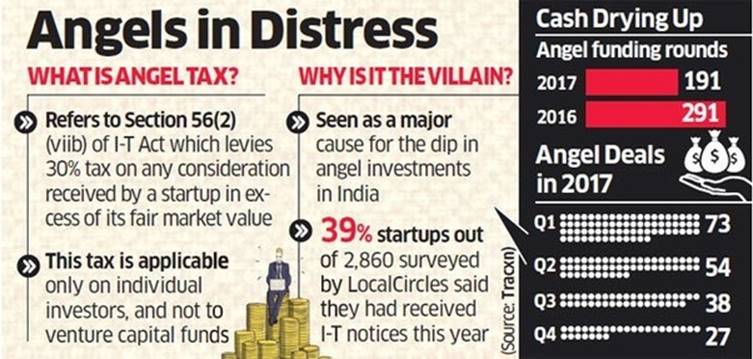
₹3-tn capital helped PSBs to just trim losses
The massive ₹3 trillion capital infusion by the government into state-run banks over the past six years has helped them reduce losses but has failed to boost credit growth, says a report.
- Between FY14 and FY19, the government has infused ₹3 trillion in state-run banks, a good portion of which came in from LIC.
- While the government has infused huge capital into PSBs, the same has largely been used to mitigate losses and has failed to contribute meaningfully to credit growth.

Reference:https://www.thehindu.com/business/3-tn-capital-helped-psbs-to-just-trim-losses/article28917689.ece
No action even if CSR norms aren’t followed
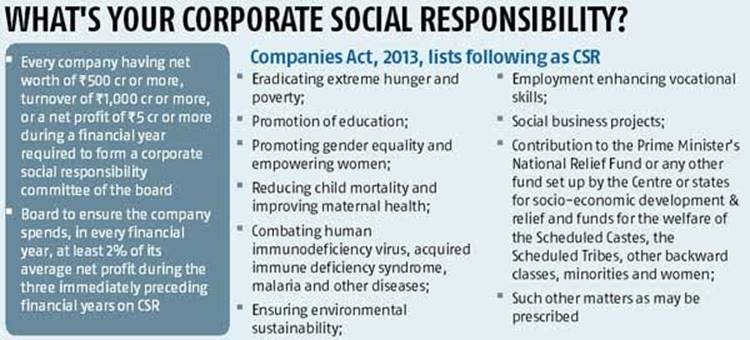
The government has given an assurance that it will not initiate punitive action against companies not following the Corporate Social Responsibility (CSR) norms as mentioned in the recent amendments to the Companies Act.
- The recent amendments to the Companies Act mandate a jail time of up to three years and a possible fine for those companies and its officials that do not comply with the stated CSR norms.
- The Finance Ministry will also be looking into ways to ensure that the rate cuts undertaken by the Reserve Bank of India are passed on to consumers by banks.
- Government needs to look at the small savings rates and reduce them in line with the market rates. If that does not happen, then the ability of banks to reduce deposit rates and hence ease the lending rates will be at best limited.”
Reference:https://www.thehindu.com/business/no-action-even-if-csr-norms-arent-followed/article28917542.ece
Explained: What the new IPCC report says on land and climate change
The Intergovernmental Panel on Climate Change (IPCC) released report presents new evidence on how the different uses of land forests, agriculture, urbanisation are affecting and getting affected by climate change.
Intergovernmental Panel on Climate Change (IPCC):
- The Geneva-based IPCC is the United Nations body for assessing the science related to climate change. It was created “to provide policymakers with regular scientific assessments on climate change, its implications and potential future risks, as well as to put forward adaptation and mitigation options”. The IPCC is an organization of governments that are members of the United Nations or WMO. For the assessment reports, IPCC scientists volunteer their time to assess the thousands of scientific papers.
- Created in 1988 by the World Meteorological Organization (WMO) and the United Nations Environment Programme (UNEP).
- This is the first time that the IPCC, whose job it is to assess already-published scientific literature to update our knowledge of climate change science, has focused its attention solely on the land sector.
- It is part of a series of special reports that IPCC is doing in the run-up to the sixth edition of its main report, blandly called the Assessment Reports, that is due around 2022.
- Last year, the IPCC had produced a special report on the feasibility of restricting global rise in temperature to within 1.5 degrees Celsius from pre-industrial times.
The land-climate link:
- Land use, and changes in land use, have always been an integral part of the conversation on climate change. Land acts as both the source as well as a sink of carbon.
- Activities like agriculture and cattle rearing are a major source of methane and nitrous oxide emissions.
- Soil, trees, plantations, and forests absorb carbon dioxide for the natural process of photosynthesis, thus reducing the overall carbon dioxide content in the atmosphere.
- Deforestation, urbanization and change in cropping pattern, have a direct impact on the overall emissions of greenhouse gasses.
What this report says:
- Land-related activities are contributing to global warming, different uses of land, like agriculture, industry, forestry, cattle-rearing, and urbanisation are affecting emissions of greenhouse gases.
- Pre-production activities like cattle rearing and post-production activities like transport, energy and food processing and food production could contribute as much as 37 per cent of all greenhouse gas emissions every year.
- Nearly 25 per cent of all food produced is either lost or wasted. And even the decomposition of the waste releases emissions.
Land, oceans, forests:
- Land and ocean together absorb nearly 50 per cent of greenhouse gases emitted every year through natural processes in the carbon cycle.
- The importance of land, or ocean, as a carbon sink, thus cannot be overstated in the global fight against climate change.
India has promised that it would create an additional carbon sink of about 2.5 billion to 3 billion tonnes by the year 2032 by increasing its forest cover, and planting more trees.
India to seek boost to protection status of 5 species at CITES
India has submitted proposals regarding changes to the listing of various wildlife species in the CITES secretariat meeting, scheduled later this month in Geneva, Switzerland.
CITES:
- CITES (Convention on International Trade in Endangered Species on Wild Fauna and Flora) is an international treaty to ensure that trade in wild animals and plants do not threaten their survival.
- CITES is an international agreement to which States and regional economic integration organizations adhere voluntarily. States that have agreed to be bound by the Convention ('joined' CITES) are known as Parties.
- CITES is legally binding on the Parties – in other words they have to implement the Convention – it does not take the place of national laws. Rather it provides a framework to be respected by each Party, which has to adopt its own domestic legislation to ensure that CITES is implemented at the national level.
Proposal provisions:
- The proposals submitted are regarding changes in the listing of the smooth-coated otter, small-clawed otter, Indian star tortoise, Tokay gecko, wedgefish and Indian rosewood.
- The country seeks to boost the protection of all the five animal species as they are facing a high risk of international trade.
- For the Indian rosewood, the proposal is to remove the species from CITES Appendix II. The species covered by CITES are listed in three appendices on the degree of protection they require.
- India is among the parties proposing the re-listing of the star tortoise from CITES Appendix II to Appendix I. The species faces two threats: loss of habitat to agriculture and illegal harvesting for the pet trade.
- With regard to the two otter species, India, Nepal and the Philippines have proposed that the listing be moved from CITES Appendix II to Appendix I for the more endangered species. A similar proposal has been made to include the Tokay gecko in Appendix I.
- India would also support proposals for boosting protection status of tarantulas, made by other countries.
TRAFFIC:
- It is the wildlife trade monitoring network. A joint program of WWF(World Wildlife Fund for Nature) and IUCN (International Union for Conservation of Nature)
- TRAFFIC works to ensure that trade in wild plants and animals is not a threat to the conservation of nature. TRAFFIC has gained its greatest reputation from supporting CITES, the Convention on International Trade in Endangered Species.
- TRAFFIC was created in 1976 it has helped with the evolution of this international wildlife trade treaty.
Maharashtra to set up task force on climate change
- In the wake of an unprecedented flood-like situation and record rainfall this season, the State government will constitute a task force comprising local and global experts to study impact of climate change on Mumbai.
- The task force will study measures taken against flooding and unplanned reclamation in cities such as Venice, Geneva and London, and coordinate with the European Climate Change Programme of the European Union to prepare a blueprint.
- The environment department in coordination with Mumbai First, a not-for-profit, will set up the task force, policy-influencing think tank, officials said.
- Government will also participate in an international conference on climate change, which will be organised by Mumbai First.
- The task force will also study patterns of climate change and steps taken by leading countries such as the Netherlands, which has taken a lead in flood management and measures against climate change.

© 2025 iasgyan. All right reserved